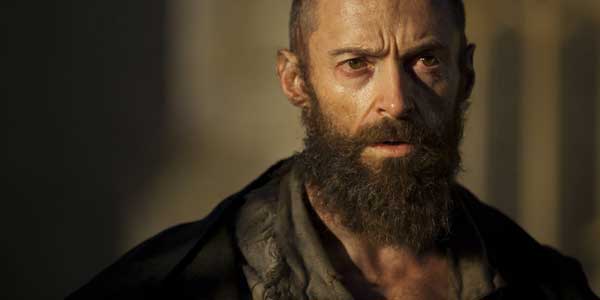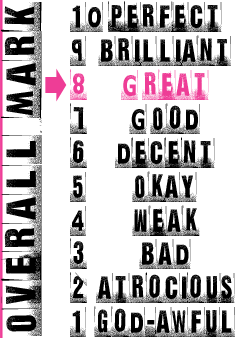
Director: Tom Hooper
Running Time: 164 mins
Certificate: 12
Release Date: May 13th 2013

The shortest acting performance ever to win an Oscar is Beatrice Straight in Network, who picked up the Best Supporting Actress Academy Award despite only being on-screen for five minutes and forty seconds. Anne Hathaway can’t beat that, as her Fantine gets a comparatively lengthy 15 minutes of screen time in Les Miserables. However I’d argue she won the Best Supporting Actress gong purely for the 277 seconds she spends singing I Dreamed A Dream.
It really is a remarkable few minutes, all done in one take. While there are moments when director Tom Hooper’s decision to get all the actors to sing the songs live doesn’t fully work, with Hathaway it’s brilliant. She’s raw, personal and full of emotion, realising that she’s giving a fully wrought performance, not singing a song.
If you don’t know, Les Miserables tells the story of Jean Valjean (Hugh Jackman), who’s released from a ridiculously long prison sentence after being convicted of stealing bread. Shunned by everyone, he’s given a second chance by a priest, who tells he must become an honest man.
The tale then follows him through the years, where he shed his previous identity and becomes a prominent citizen with his own business. After accidentally wronging a dying young woman called Fantine (Hathaway), Valjean promises to protect her daughter, Cossette. That leads him to Paris and eventually to the heart of a student-led revolution.
And over the decades Valjean is being hunted down by obsessive policeman Javert (Russell Crowe), who’s determined to capture this man who skipped out on his parole.
The film version of Les Miserables is an entertaining ride, although it has exactly the same strengths and weaknesses as the stage version. Victor Hugo’s novel is an enormous, decades-spanning tome, so even at two hours and 40 minutes, the film has to rush through the events to fit in as much as possible. As a result there’s a slight sensation you’re seeing a story in shorthand, where if you stop to think about things for even a second, the whole thing is more than a little bit ridiculous. After a while you also realise that this is a world populated solely by angels and demons, with absolutely no grey area. It may be a story about the terrible lot of the poor – aka the miserables – but they’re painted as such saints it’s not that realistic.
However it’s held together by a strong emotional throughline (even if the emotions sometimes don’t have much logic backing them) and a series of incredibly powerful musical setpieces. Indeed, few musicals can boast as many good individual songs that are both musically and lyrically powerful, even if the bits in between can sometimes be slightly problematic. The music also has a rather epic feel, which is certainly heightened in the movie when accompanied by strong visuals.
Over the years many people have fallen in love with Les Miserables on stage, while others have found it a bit daft and melodramatic. People will have exactly the same reaction to the movie, which manages to be its own beast visually but dramatically sticks close to the stage version. It certainly works, even if there are moments when it’s difficult not to wish it had transcended its stage roots a little more. Indeed, while King’s Speech director Tom Hooper managed to finally get the movie made after it had been trapped in development for two decades, to be honest I’m not completely convinced he was the best man for the job.
His style seems so concerned with things such as catching the singing live on set and putting the viewer you in the thick of the action, that it sometimes loses sight of what the film’s actually doing. And while it may be a result of the limitation placed on the production by the singing, some of the editing is incredibly clumsy. (In fact, I couldn’t help wonder if some of the songs done largely in one take had to be that way purely because the live vocals meant that cutting was virtually impossible – it’s effective, but it could well have been down more to necessity than initial choice).
The whole thing is anchored by a truly excellent turn from Hugh Jackman, one of the very few people in the world with the mix of singing, acting and charm – as well as the sheer physical brawn – to fully bring Jean Valjean to life on screen. Eddie Redmayne’s singing voice may sound a little like an operatic Kermit as the student revolutionary Marius, but he’s very good too. The only slightly weak link is Russell Crowe as the single-minded Javert. On an actorly level he makes it work, but his voice isn’t quite up to the job, flattening his overall performance.
While there may be a few flaws, there’s no doubt that overall the film is a success. By sticking to the emotional heart and the strength of the musical setpieces, it occasionally soars. It also realises that what often turns a good musical into a beloved one is a strong, uplifting ending that keeps the audience humming as they leave the theatre or cinema. While I feel Les Miserables could have hit it harder, it does more than enough to ensure it goes out on a high.
On Blu-ray it certainly looks good, allowing the recreation of early 1800s France to really shine. It does highlight the movie’s sometimes uneasy mix of realism and theatricality, but it still pulls together. The picture is sharp, the colours excellent and the blacks deep, which is especially important as there are a few fairly dark night scenes.
As you’d hope for a musical, the audio is crisp and clear too. Due to the way it was shot, there are inevitably flaws in the vocals, but that’s exactly as it should be, and the DTS Master Audio really helps put across the feel that you’re hearing it as performed on the day (although I’m sure there was a little tinkering at some point).
There may only be three things on the list of special features, but the length and quality makes up for the lack of quantity. The ‘Making Of…’ documentary is an hour long and covers all stages of the film, from conception to completion. There are plenty of interesting things included, such as the difficulties of recording the singing live – which meant there could be no other sound on the set, with the actors spending most of the time on carpets, so the microphones wouldn’t even pick up their footsteps. There’s also an interesting look at the number of people who’ve starred in the stage version who pop up in the film, from original Valjean, Colm Wilkinson, as the priest to Frances Ruffelle as a prostitute.
The disc includes a 10-minute long featurette looking at the life of Victor Hugo, which includes such interesting nuggets as the fact the writer completed Les Miserables while living in the Channel Islands, after he eas essentially exiled from France. The special features are completed by an interesting commentary from Tom Hooper.
Overall Verdict: After 20 years in the making, the film version of Les Miserables may have a few flaws (some of which have been ported over from the stage version), but it sticks close enough to the emotional heart and great music that’s it’s a success.
Reviewer: Tim Isaac





Leave a Reply (if comment does not appear immediately, it may have been held for moderation)